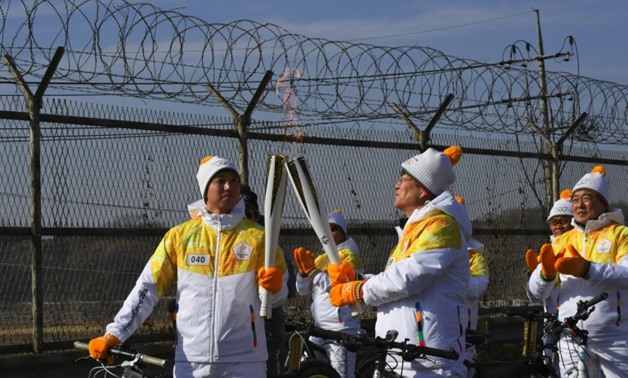
The Olympic flame is passed in front of a military fence on the road leading to the border truce village of Panmunjom during the PyeongChang 2018 Torch Relay in Paju - AFP
20 January 2018: After the two Koreas struck a deal for the North to attend the Winter Games in the South, Olympic bosses will try Saturday to resolve the devils in the details of the landmark pact.
With less than three weeks to go before the Games in Pyeongchang begin, the most momentous decisions have already been made.
North and South Korea will march together at the opening ceremony under a unification flag and field a united women's hockey team, while the North has said it will send a 550-member delegation to the Games.
North Korea has taken part in seven of the last 12 Winter Olympics, most recently in Vancouver 2010.
But its presence in Pyeongchang -- just 80 kilometres (50 miles) south of the demilitarised zone that divides the Koreas -- is a significant diplomatic coup, especially after months that saw nuclear and missile tensions surge to new heights.
Now the International Olympic Committee has to sign off on the terms agreed by Seoul and Pyongyang -- and try to implement them without tarnishing Olympic rules.
IOC president Thomas Bach is hosting a mini-summit at the organisation's headquarters in Lausanne, Switzerland, with the leaders of the Olympic committees from both Koreas as well Pyeongchang 2018 organisers.
Senior government officials from both countries will also be on hand.
The meeting -- where the Olympic movement could be cast as a key player in easing tensions between two nations still technically at war -- will be a welcome reprieve for the IOC.
Recent high-profile meetings in Lausanne have not been about peacemaking. Instead, they have been consumed by discussions on how heavily Russian athletes should be punished for egregious doping.
Complications
The IOC has conceded that the intra-Korean deal has made its job more complicated.
"There are many considerations with regard to the impact of these proposals on the other participating (nations) and athletes", an IOC spokesman said this week.
Clearly, some rules will have to be bent.
First, no North Koreans are technically qualified for Pyeongchang.
Figure skating pair Ryom Tae-ok and Kim Ju-sik qualified in September, but the North missed the October 30 deadline to register them.
And some have raised concerns about allowing two nations to field a joint women's hockey team.
"The participation of a united Korean team is a good idea politically and diplomatically, but when it comes to fairness in sport it raises some questions," Swiss ice hockey federation spokesman Janos Kick told AFP.
There is precedent for fielding a joint team in international competition, including at the 1991 football under-20 World Cup, when the two Koreas competed together and even advanced to the quarter finals.
The IOC has said it wants to be "as flexible as possible" in maximising North Korean participation at the 2018 Games and has opened the door to some of the country's speed-skaters and skiers competing.
The International Bobsleigh and Skeleton Federation said a united four-person Korean team could be allowed to make a ceremonial appearance.
The sides are expected to issue a statement following Saturday's talks announcing the final arrangements.
Whatever gets decided, the North's military strength is unlikely to be matched by its performance at the Olympics, as the country has only won two medals in the history of the Winter Games, in 1964 and 1992.
UN sanctions
Beyond Olympic competitors, the North has also agreed to send 230 cheerleaders to back athletes from both Koreas as well as a separate 150-member delegation of supporters, athletes, journalists and others to the Paralympics in March.
A further complication for Seoul and the IOC is ensuring that while accommodating the North and ensuring that the so-called "peace Olympics" pass off smoothly, neither violates United Nations sanctions.
Security Council measures currently in force prohibit cash transfers to the North, while the UN has also drawn up a blacklist of officials tied to the Stalinist Pyongyang regime, individuals whose presence at the Games will create potential stumbling blocks.


Comments
Leave a Comment